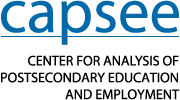Graduates of For-Profits Lag Behind Their Peers in Earnings and Employment, Study Finds | 2/22/2012
Research on for-profit colleges by CAPSEE’s David Deming, Claudia Goldin, and Lawrence Katz is summarized in The Chronicle of Higher Education.
The Actual Careers That Result From Career Colleges | 2/22/2012
CAPSEE’s research findings on the job outcomes of students who attend for-profit colleges are featured in Washington Monthly.
NEW YORK, NY (Feb. 21, 2012) — Students who attend for-profit colleges are less likely to be employed and have lower earnings six years after enrolling than similar students who attend public and not-for-profit colleges, according to a new study by authors affiliated with the Center for Analysis of Postsecondary Education and Employment (CAPSEE). They also carry heavier debt burdens and are more likely to default on their student loans.
By: David Deming, Claudia Goldin, & Lawrence Katz | February 2012
This paper describes the schools, students, and programs in the for-profit higher education sector, its phenomenal recent growth, and its relationship to the federal and state governments. A version of this paper also appears in the Journal of Economic Perspectives.
Compiled by: Vivian Liu | February 2012
This bibliography is a list of recent studies on the rate of return to college in the United States.
For-Profit Schools: ‘Agile Predators’ or Just Business Savvy? | 1/9/2012
Time highlights findings from CAPSEE’s for-profit study, considering whether for-profit institutions are predatory or merely capitalizing on the increased demand for college degrees.
For-Profit College Students Face Higher Debt, More Unemployment, Report Finds | 1/4/2012
An article in The Huffington Post provides detailed coverage of CAPSEE’s research on the student-loan debt and employment outcomes of students at for-profit colleges versus public or private nonprofit schools.
Study Finds Mixed Results for Students Attending For-Profit Colleges | 1/3/2012
The Chronicle of Higher Education highlights results from a study on for-profit colleges by David Deming, Claudia Goldin, and Lawrence Katz. The study found that students attending for-profit colleges are more likely to persist through their first year and graduate from short-term programs than their counterparts in public or private nonprofit colleges; however, employment outcomes after graduation were weaker for the former group.
By: Judith Scott-Clayton | National Bureau of Economic Research | January 2012
Recent cohorts of college enrollees are more likely to work, and work substantially more, than those of the past. October CPS data reveal that average labor supply among 18 to 22-year-old full-time undergraduates nearly doubled between 1970 and 2000, rising from 6 hours to 11 hours per week.
Building a Qualified Workforce for the Future: New Trends in Higher Education | 12/14/2011
CAPSEE’s Claudia Goldin appeared on an episode of The Diane Rehm Show focused on higher education in the United States; among other issues, she spoke about CAPSEE’s findings on for-profit institutions.
